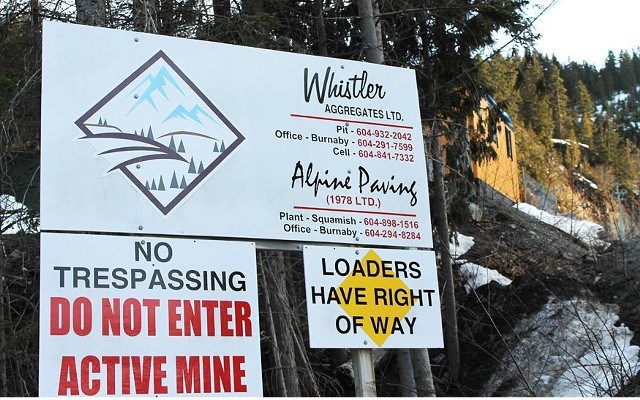A decision to award this year's municipal paving contract was delayed until the June 6 council meeting to allow for some "difficult discussions."
A tender for the contract received just one compliant bid — from Alpine Paving Ltd. — but after a short presentation at its May 23 meeting, council decided to table the $2.9 million contract.
Alpine Paving is owned by Frank Silveri, who also owns the Whistler Aggregates asphalt plant in Cheakamus Crossing.
The Resort Municipality of Whistler (RMOW) officially opposed renewal of the plant's tenure in March.
The plant is now operating on a month-to-month basis until the province makes a final decision on renewal.
"We're not going to get a resolution of that in two weeks, but we need to have a good conversation with Mr. Silveri about how we move on from here," said Mayor Nancy Wilhelm-Morden at the meeting.
Major paving work to be done this year includes the Alpine Meadows neighbourhood, Lorimer Road, the Gondola Transit Exchange, portions of Blackcomb Way and a small area of Lot 5.
Some sections of the Valley Trail — near the Whistler Golf Club, the Skateboard Park and Whistler Road — are also due to be repaved.
The total amount of roads requiring re-paving this year is about 90,000 square metres, which would take about 17,000 tonnes of asphalt.
Alpine Paving's bid for the work was $2.9 million, with an alternative bid attached that would bring that cost down by five per cent (or about $145,500) if the asphalt could be sourced from the Whistler Aggregates plant at Cheakamus rather than Squamish.
But accepting the alternative bid would send a "ridiculously confused" message to the province, Wilhelm-Morden said.
"It's no secret that we're not happy with the location of the plant, and we want to work with Mr. Silveri to resolve that issue," she added after the meeting. "The province has recognized that there is an issue by, at this point, only giving a (month-to-month) extension, so before we hand over a very valuable contract, let's see if we can get something going where we can resolve our issues."
Asked what might change in just two weeks, with only one compliant bid for the work received on first tender, Wilhelm-Morden said council may just decide to forego all or part of the paving work this year.
"Now, that would be an extraordinary step, but you know, let's have some conversations," she said.
The RMOW changed to a three-year paving cycle in 2013, which would allow the big paving projects to be addressed every three years and minor repairs being taken care of in the other two years. The goal was to reduce costs and encourage competition, though so far the competitive aspect has not panned out, with just one bid in 2017 and two in 2014.
RMOW staff has also noticed an increase in degradation on Whistler's roads since the change.
"I think staff needs to just revisit this three-year cycle thing, because the goals that we were hoping to achieve by having contractors take advantage of the economies of scale and to encourage additional competitive bids... we're in our second three year phase and it just hasn't manifested itself," Wilhelm-Morden said. "So I just think we need to revisit that whole program."
The three-year cycle will be reviewed this summer to see if a different approach is needed.




